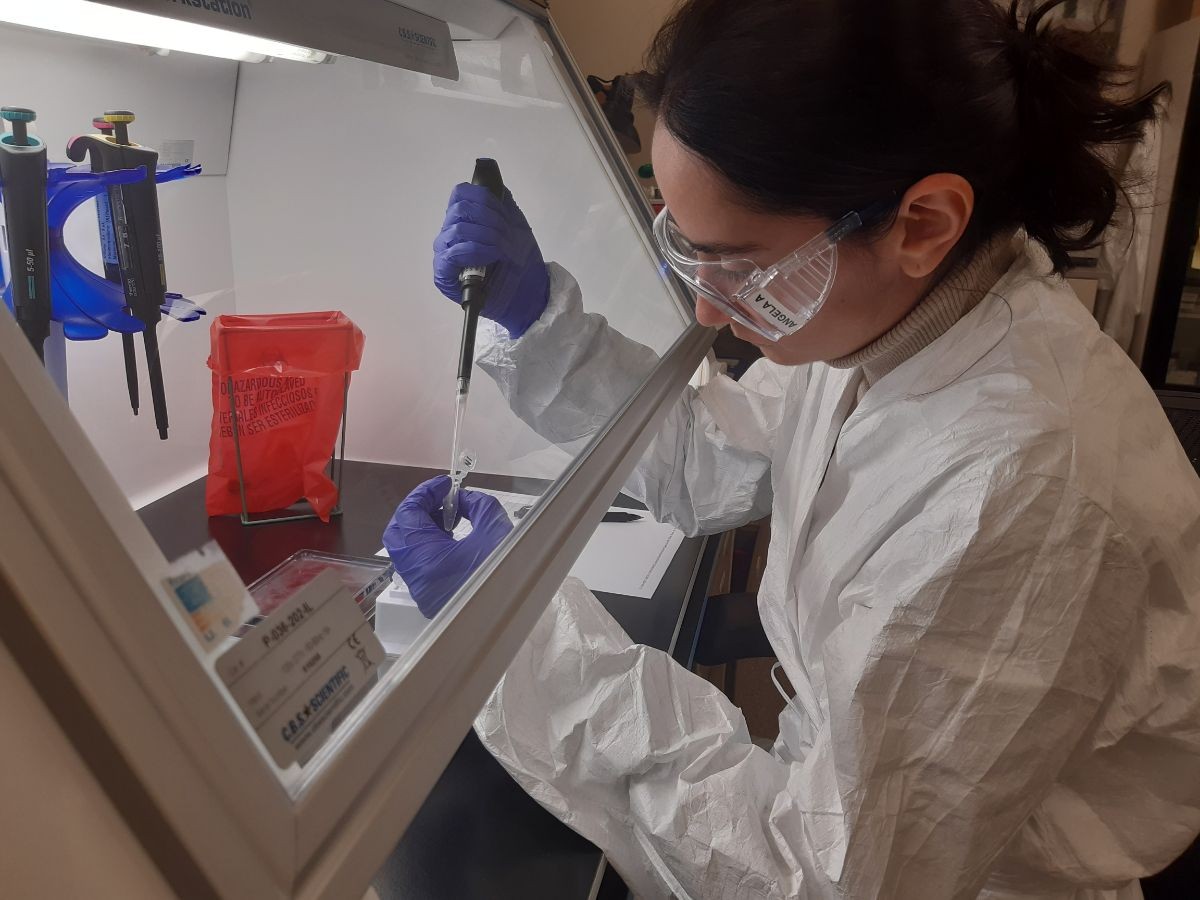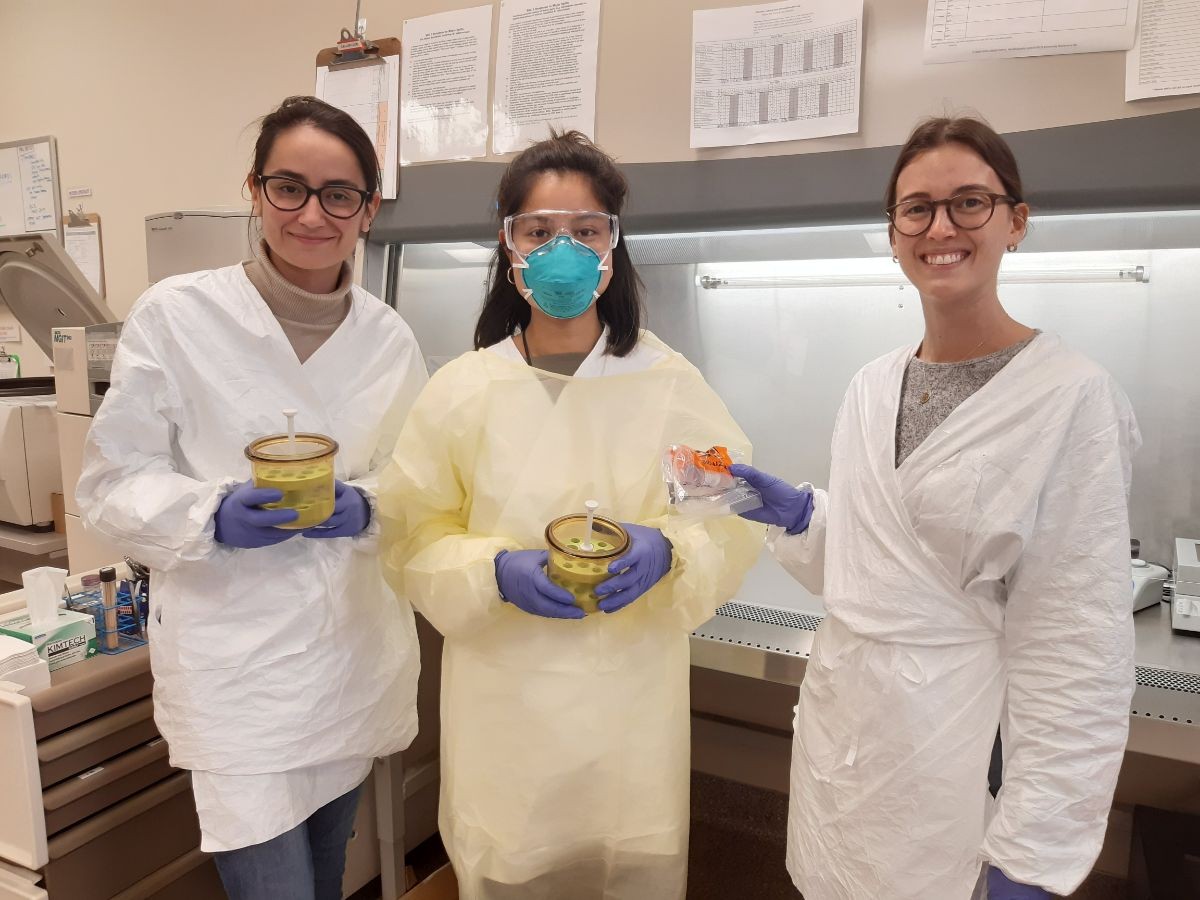Helping Fight Covid-19

Photo by: Provided CSUMB science student Angela Albanese volunteers in the Monterey County Health Department lab to help test for COVID-19.
May 15, 2020
Science students working in labs have huge impact on testing efforts
By Sophia Huang McKenzie
Early on in the global pandemic, CSU Monterey Bay student Angela Albanese learned the alarming news about the heavy toll the coronavirus was taking in her home country of Italy. The epicenter of Europe’s outbreak, Italy logged the highest number of coronavirus deaths in the world in March.
“What COVID-19 caused back home scared me, but also pushed me to take action,” Albanese said. “When I heard that the Monterey County Health Department needed extra help with the COVID-19 testing, I immediately made my time and lab skills available to the community.”
Albanese, a biology major in the College of Science, is one of several area science students who volunteered to work at the lab when a call went out for help. The lab previously had only three employees to conduct testing, and no funds to hire more.
The student volunteers enabled COVID-19 testing capacity to increase dramatically by seven times in just five weeks, the lab told CSUMB’s KAZU radio station in April. The lab extended its hours and testing numbers went up from about 20 specimens a day to a record number of 150. Patients in Monterey and San Benito counties were then able to receive test results within a day or two, instead of having to wait longer.

From left: Angela Albanese, Pilar Renta and Melissa Naugle have helped the county increase it's COVID-19 testing capacity by seven times.
“I am truly honored to contribute to the effort the world is making to fight this pandemic,” Albanese said.
A CSUMB graduate student in marine biology, Melissa Naugle also volunteers at the county lab. Naugle normally conducts research at the Marine Ecological Physiology Lab.
She studies coral bleaching, which occurs when corals are stressed by changes in conditions such as temperature, light or nutrients, according to the National Oceanic and Atmospheric Administration. The corals turn completely white and become in danger of dying. Naugle’s lab experience proved valuable.
I am truly honored to contribute to the effort the world is making to fight this pandemic."— Angela Albanese, science student
“Since the lab protocols are really similar to my lab research at CSUMB, I was already familiar with much of the lab work,” she said.
Working in a different type of lab environment has “added breadth” to her education. “It has also been super fulfilling to volunteer my time to a cause that is directly benefiting people in my community,” Naugle said.
The county employs a third CSUMB science student, Pilar Rentar, as a laboratory assistant. Rentar is enrolled in a biochemistry class as a post-baccalaureate student preparing for graduate school.
CSUMB biology major Kaylee Wehunt assists with COVID-19 antibody testing at ARCPoint Labs, a private diagnostic testing laboratory in Monterey. The antibody test “identifies who has had the virus and who may still be fighting it off,” she explained.
Working at the lab, “I am applying the knowledge I have gained from my immunology course this semester to benefit my community,” Wehunt said.
A certified phlebotomist — someone trained to draw blood from a patient for clinical or medical testing, transfusions, donations, or research — Wehunt had just started working at the lab when the pandemic started.
“This is my first experience in this type of lab setting, as well as the first time I am able to put my licensure to use in an official capacity. While nervous, I was hopeful to begin making a difference in the community by offering much-needed testing as soon as possible,” Wehunt said.
“Being able to work in the lab is an opportunity I will forever be grateful for. I am able to practice phlebotomy while also helping make a difference during this pandemic.”